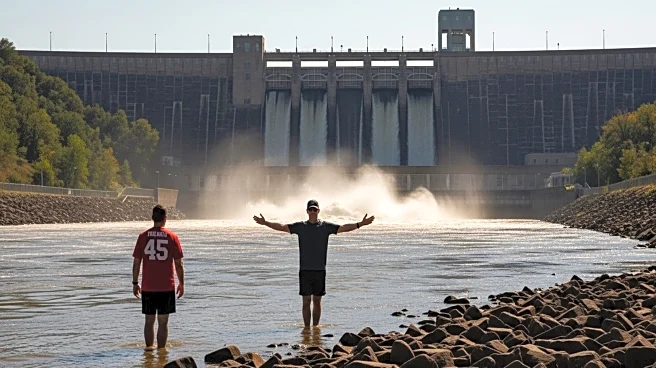What's Happening?
Recent flooding in Egypt's northern provinces has intensified regional tensions over the Nile River, with Egyptian authorities blaming Ethiopia's newly inaugurated Grand Renaissance Dam for disrupting the river's flow. The floods have severely impacted the Beheira and Menoufia provinces, submerging farmland and homes, and prompting evacuations in the town of Ashmoun. Videos on social media depict residents wading through waist-deep water, with many homes partially submerged. In response to the rising water levels, Egypt has discharged water from its High Aswan Dam. Meanwhile, Ethiopia claims that the dam has helped mitigate flooding in Sudan, with Water Minister Habtamu Itefa Geleta stating that the dam reduced the potential catastrophic effects of the floods.
Why It's Important?
The Grand Ethiopian Renaissance Dam (GERD) is Africa's largest hydroelectric project and a significant source of diplomatic tension between Ethiopia, Egypt, and Sudan. The dam is crucial for Ethiopia's economic development and regional energy ambitions, as it is expected to double the country's electricity generation capacity. However, Egypt and Sudan fear that the dam could significantly affect their share of the Nile's waters, which are vital for their water security. The ongoing dispute highlights the complex geopolitical dynamics in the region, with Ethiopia's unilateral actions being perceived as a threat by downstream countries. The situation underscores the need for a legally binding agreement to manage the Nile's resources equitably.
What's Next?
The completion and inauguration of the GERD without a legally binding agreement have further intensified the dispute between the involved nations. Ethiopia has bolstered security around the dam, acquiring advanced air defense systems to protect it from potential threats. Egypt continues to raise concerns with the international community, framing the dam as an existential threat to its water security. Diplomatic efforts are likely to continue as the countries seek a resolution to the ongoing tensions. The situation may also prompt further international mediation to ensure equitable use of the Nile's waters and prevent future conflicts.
Beyond the Headlines
The GERD project reflects broader issues of water rights and resource management in transboundary river systems. The situation raises ethical and legal questions about the equitable distribution of natural resources and the responsibilities of upstream and downstream countries. The dam's impact on regional stability and cooperation could have long-term implications for economic development and environmental sustainability in the region.









